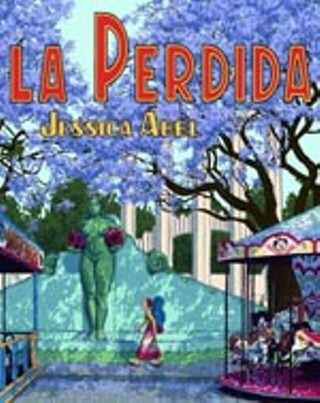Book Review: Readings
Jessica Abel
Reviewed by Wayne Alan Brenner, Fri., May 12, 2006

LA PERDIDA
by Jessica Abel
Pantheon, 275 pp., $19.95
Twentysomething Carla, half-Mexican, half-American, goes south of the border to search for the roots of her heritage and becomes enmeshed with a motley group of yuppie expats, leftist agitators, club kids, drug dealers, kidnappers, and the various reckless phantoms of her own naivete. It's a hell of a story, originally published serially by Fantagraphics.
Because Jessica Abel's La Perdida takes place in Mexico City and involves a sometimes frictional intermingling of Mexicans and Americans, it's attracted comparison to Los Bros Hernandez's classic Love and Rockets. And, yes, the cultural resonances are obvious; but let's instead use that truth to dance about the visual architecture of what Abel's rendered. Because we are, after all, talking about a graphic novel here, and not just an interesting narrative.
With Los Bros, we have the drawing style of Gilbert Hernandez, which is serviceable and quirky, only ever in need of a certain polish; and we have his brother Jaime's style, a stark, realist's distillation of the influence of Dan DeCarlo, only ever in need of a certain roughness. Abel's style, precise brushwork, honed through many projects (most notably her series Artbabe), shines somewhere between those two values and provides vivid pictures, expertly arranged, of what's going on. The detail she fits into a single panel can be astonishing and provides a necessary sense of place in this story that is so much about place – physical and emotional.It's unsurprising that, in moving her typical youth crowd from the bars and bedrooms of the urban U.S. and into the less familiar Mexican metropolis, the creator of Artbabe has increased the depth and diversity of her characters. What is surprising is the natural ease with which the subplot of menace grows inside the larger story, is derived from the milieu of economic deprivation and political unrest and the necessary interzone of cultures. But then, this ease is due to the story's characters, who, like the denizens of so many of Abel's comics, are distinct individuals and motivated by desires beyond those of any Ludlumed plot requirements.










